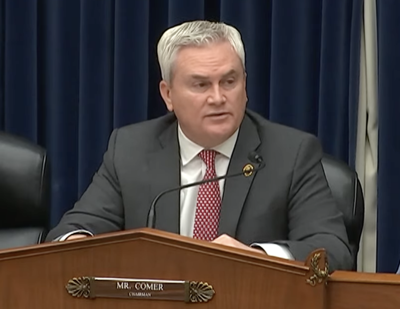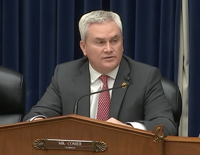(The Center Square) – The U.S. House Committee on Oversight this week began an investigation into the Chinese Communist Party’s “Influence and infiltration campaign,” which House Republicans argue is threatening U.S. military readiness and every aspect of American society.
“If we don’t understand what the CCP is and that this authoritarian regime considers America its ‘main enemy,’ we cannot secure our country,” Chairman James Comer, R-Ky., said. “For decades, the CCP has sought to infiltrate and influence every aspect of American society. Chief among the Party’s tactics is political warfare. Political warfare is meant to influence the emotions, motives, and behavior of Americans in a manner favorable to China’s objectives.”
The CCP is targeting U.S. farmers, businesses, K-12 schools, universities, research institutions, technology, its energy and food supply, the defense industry, critical infrastructure, media, Silicon Valley, Wall Street, among other entities, he said.
Retired U.S. Air Force Brig. Gen. Robert Spalding, CEO of SEMPRE, and senior fellow at the Hudson Institute, said the U.S. is currently “in a new Cold War. Our adversaries wield weapons far beyond the traditional military arsenal, instead harnessing the power of communication to distort and manipulate the very fabric of our society.”
The CCP and its proxies are waging “a global political war to influence the face of human civilization, using the tools of statecraft, business, economics, trade, finance, academia, and especially technology,” he said. “Chinese companies, working on behalf of the Communist Party, influence American businesses and financial institutions with seductive promises. In turn, these American organizations influence our political process to ensure we maintain an economic connection to the Party’s influence, simultaneously eliminating manufacturing jobs for America’s working class.
“Our universities and educational system are influenced economically with grants and Chinese student tuition,” he continued. American scientists “are influenced to move technology to China” and state, local and federal politicians “are influenced by Chinese investment and the often-unfulfilled promise of jobs in their districts.” Spalding also expressed alarm about social media apps Temu and TikTok harvesting user data.
The solution is to “completely separate the institutions of the free world from Chinese Communist Party influence,” he said.
Retired U.S. Marine Corps Col. Grant Newsham expressed alarm about the China threat, saying, “the CCP through various political warfare is embedding behind our lines.” The U.S. has “never faced such a serious domestic attack” and is “just one we refuse to recognize.”
Newsham referred to the fentanyl crisis in the U.S. as chemical warfare being waged against Americans by the CCP. The number of people killed by fentanyl poisoning is more than those who died in the Vietnam War, he said. Citing a newly published report by the U.S. House Select Committee on the Strategic Competition between the United States and the Chinese Communist Party, he said, “China’s subsidizing the production of fentanyl precursors and the U.S. is letting it happen.”
The report details how the People’s Republic of China under the leadership of the Chinese Communist Party “is the ultimate geographic source of the fentanyl crisis in the U.S.”
Newsham also cited examples of how the CCP is waging “economic warfare” against the U.S. in an attempt to destroy the U.S. manufacturing and commercial sectors.
He listed several potential solutions, including rebuilding the U.S. military and federal leaders relearning political warfare. “Someone needs to be responsible for the political warfare effort and its success or failure,” Newsham said. “Currently nobody is, and we should fight back.”
He said Congress should repeal China's Permanent Normal Trade Relations status, in line with a bill filed by U.S. Sen. Tom Cotton, R-Ark., and delist Chinese companies on U.S. exchanges if they don't immediately meet listing standards.
The U.S. should institute a strict outbound review of investment into the PRC, including tightening export controls on technology to make it more costly to act as a proxy for the CCP, he said. This would involve imposing real reporting requirements for individuals and entities operating on behalf of PRC interests and enforcing the restriction, among other recommendations.
International law, national security law expert and former active-duty Navy JAG attorney Jonathan Hullihan supports repealing China’s PNTR, or “Most Favored Nation” status, but also said Congress could amend the Jackson-Vanik Amendment, or any other applicable law, to require China to halt the manufacturing and shipment of fentanyl precursors to Mexico.
Stripping China’s MFN status “is long-overdue,” Hullihan told The Center Square. “But what would be even more impactful is providing additional terms to require China to halt the manufacturing and shipment of fentanyl precursors to Mexico if China ever wants to have MFN status again. This would have a direct impact on the fentanyl crisis by cutting off the cartels’ supply. The U.S. has had a history of telling China to crack down on fentanyl distribution, but it hasn’t been effective.”
Comer said his committee is examining potential solutions for federal agencies to adopt to safeguard Americans from CCP tactics and to thwart China’s political warfare. The hearing was the first in a series “that will expose China’s dangerous infiltration campaign,” he said.











